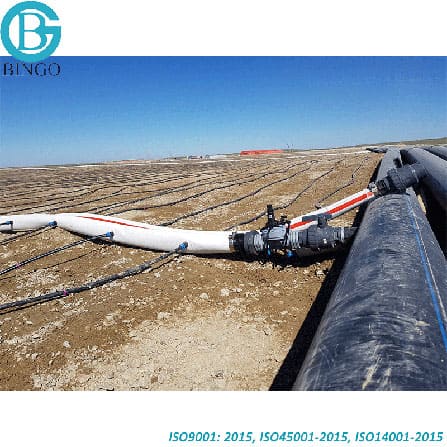Common Questions About Texas hdpe pipe manufacturer and Their Products
Understanding the Trick Conveniences of HDPE Pipeline for Water and Wastewater Management
Making use of HDPE pipeline in water and wastewater monitoring presents countless advantages that merit factor to consider. Its extraordinary durability and lengthy life expectancy make it a favored option for lots of projects. Additionally, the material's resistance to rust and chemical damage boosts its reliability in different settings. Nevertheless, the advantages expand past simply longevity and resistance. Exploring its cost-effectiveness and ecological impact discloses even much more compelling reasons for its widespread adoption in modern framework
Extraordinary Resilience and Durability

HDPE pipeline stands out for its outstanding toughness and longevity, making it a favored option in water management systems. Constructed from high-density polyethylene, these pipelines can hold up against significant pressure and stress and anxiety, making certain trusted performance gradually. Their durable nature enables them to sustain extreme ecological problems, including temperature changes and dirt movements, which can cause other products to stop working.
The life-span of HDPE pipelines often goes beyond 50 years, offering an affordable remedy for towns and industries alike. Furthermore, the material's lightweight properties streamline installment, reducing labor costs and timeframes. This longevity reduces the need for frequent repairs or replacements, even more improving its economic allure.
In water management applications, the dependability of HDPE pipes means fewer disturbances and enhanced service continuity, making them important to sustainable framework growth. The combination of durability and durability solidifies HDPE's role as a cornerstone in reliable water management remedies.

Resistance to Deterioration and Chemical Damage
While lots of materials surrender to deterioration and chemical damage in time, HDPE pipes show remarkable resistance, making them optimal for various water management applications. This strength comes from the molecular framework of high-density polyethylene, which is inherently non-reactive and does not rust like metals or weaken from direct exposure to severe chemicals. As an outcome, HDPE is very reliable in settings with hostile substances, such as wastewater systems that might have acids, bases, and natural solvents.
Furthermore, HDPE pipes can stand up to environmental elements such as soil level of acidity and saline conditions, further enhancing their suitability for varied applications (American Plastics HDPE Pipe Manufacturing). Their capability to maintain architectural stability in time lowers the threat of leakages and failings, which is essential in making certain the safety and security and dependability of water distribution and wastewater management systems. As a result, the resistance to deterioration and chemical damage considerably adds to the total performance and longevity of HDPE piping solutions
Cost-Effectiveness and Economic Advantages
When taking into consideration the financial effects of water administration systems, the cost-effectiveness of HDPE pipelines becomes obvious. These pipelines use reduced setup and upkeep prices compared to typical products like steel or concrete. Their lightweight nature streamlines transportation and setup, leading to minimized labor expenses. Additionally, HDPE pipelines show a long life-span, typically surpassing half a century, which translates to less substitutes and long-lasting savings.
The resistance of HDPE to deterioration and chemical damage reduces the requirement for costly repairs and replacements. The pipelines likewise support efficient water flow, lowering energy costs connected with pumping systems. By minimizing leakages and water loss, HDPE pipelines add to substantial economic benefits for towns and sectors alike. Overall, the first investment in HDPE piping can generate considerable monetary returns over the life-span of the water management system, making it a sensible option for sustainable framework development.
Ecological Sustainability and Reduced Influence

Convenience and Adaptability in Setup
Since of their one-of-a-kind residential properties, HDPE pipelines offer remarkable convenience and flexibility in setup, making them ideal for a variety of applications. Their light-weight nature enables for easier handling and transportation, minimizing labor expenses and installment time. HDPE pipes can be bent and shaped to fit numerous terrains and job needs, which is specifically useful in testing settings.
In addition, their resistance to corrosion and chemical damages permits installation in varied settings without the demand for specialized protective finishings. The capacity to fuse joints produces a continuous, leak-free system, enhancing the total honesty and integrity of the installment. HDPE's versatility likewise fits ground movement, reducing the danger of damages in areas susceptible to changing soil. Overall, these features make HDPE pipes not just flexible however also a recommended selection for water and wastewater management systems.
Often Asked Inquiries
Exactly How Does HDPE Pipeline Contrast to PVC in Water Administration Applications?
HDPE pipe supplies remarkable versatility, resistance to rust, and toughness compared to PVC. Its lighter weight assists in simpler installation, while its lengthy lifespan lowers substitute prices, making HDPE a recommended option in water administration applications.
What Is the Life Expectancy of HDPE Piping Under Regular Conditions?
Under typical problems, HDPE pipes can have a life expectancy varying from 50 to 100 years. Their resilience and resistance to deterioration contribute to their long-lasting performance in numerous applications, making them a trusted selection for framework.
Are HDPE Pipeline Recyclable After Their Life Span?
Yes, HDPE pipes are recyclable after their life span. Midland TX HDPE Pipe Fittings in Stock. They can be refined and repurposed into brand-new products, greatly minimizing environmental influence and advertising sustainability within the market, making them an eco-friendly choice for piping remedies
What Is the Installation Refine for HDPE Piping?
The installation process for HDPE pipelines entails website preparation, trenching, pipeline combination or mechanical joining, backfilling, and pressure testing. Proper methods ensure a durable read more and reliable system for transporting water and wastewater efficiently.
Can HDPE Water Lines Be Utilized for Both Safe And Clean and Non-Potable Water Systems?
Yes, HDPE pipelines can be made use of for both drinkable and non-potable water supply. Their convenience, toughness, and resistance to corrosion make them suitable for various applications, guaranteeing risk-free and effective transportation of water in various contexts.